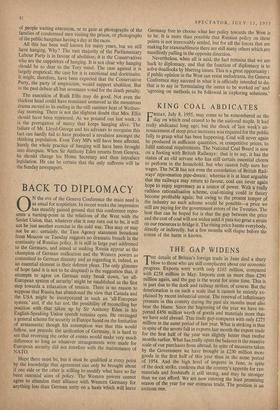KING COAL ABDICATES
RIDAY, July 8, 1955, may come to be remembered as the r day on which coal ceased to be the national staple. It had really abdicated long ago; but the shock of last week's an- nouncement of steep price increases was required for the public fully to grasp what has been happening. Coal will never again be produced in sufficient quantities, at competitive prices, to fulfil national requirements. The National Coal Board is now on a footing with British Railways : that is to say, it has the status of an old servant who has still certain essential chores to perform in the household, but who cannot fully earn her wages. The NCB has not even the consolation of British Rail- ways' rejuvenation pipe-dream : whereas it is at least arguable that the railways may return to favour, coal can never again hope to enjoy supremacy as a source of power. With a really ruthless rationalisation scheme, coal-mining could in theory become profitable again; but owing to the present temper pf the industry no such scheme would be possible—a price we still are paying for the govertiment errors of the Twenties. The best that can be hoped for is that the gap between the price and the cost of coal will not widen until it puts too great a strain on our resources to bridge it. The rising price harms everybody, directly or indirectly, but a few months will elapse before the extent of the harm is known.


































 Previous page
Previous page